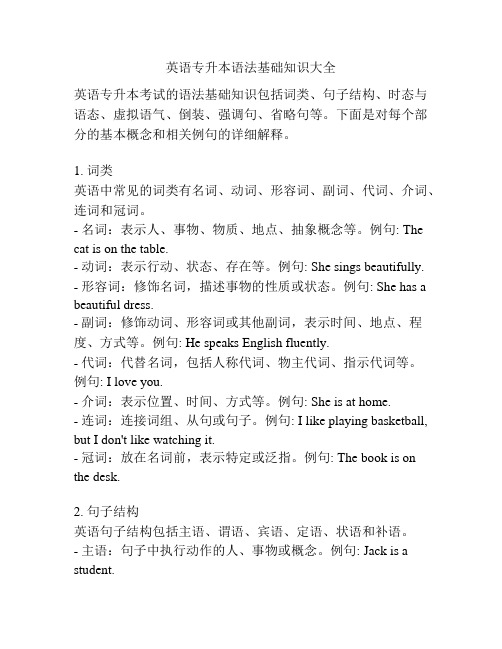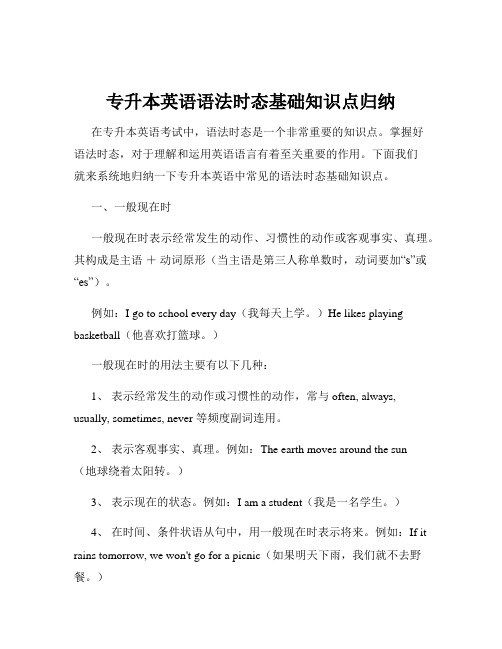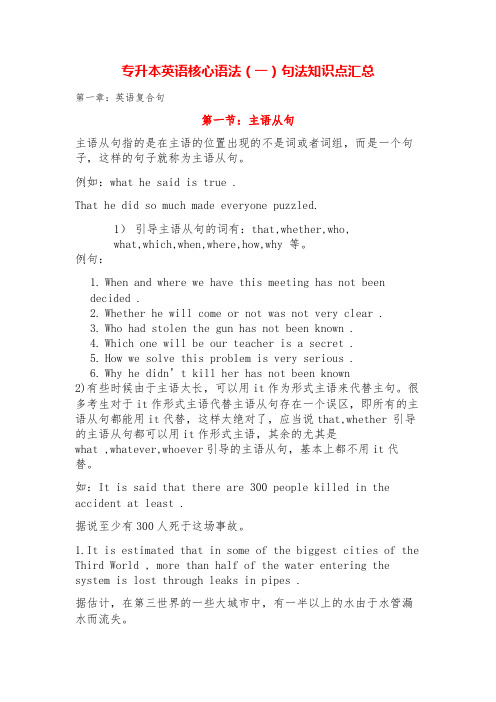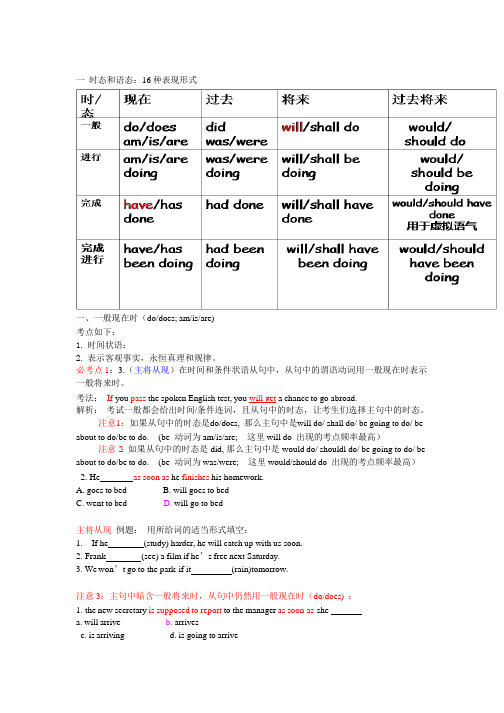01专升本英语语法知识归纳
英语专升本语法基础知识大全

英语专升本语法基础知识大全英语专升本考试的语法基础知识包括词类、句子结构、时态与语态、虚拟语气、倒装、强调句、省略句等。
下面是对每个部分的基本概念和相关例句的详细解释。
1. 词类英语中常见的词类有名词、动词、形容词、副词、代词、介词、连词和冠词。
- 名词:表示人、事物、物质、地点、抽象概念等。
例句: The cat is on the table.- 动词:表示行动、状态、存在等。
例句: She sings beautifully. - 形容词:修饰名词,描述事物的性质或状态。
例句: She has a beautiful dress.- 副词:修饰动词、形容词或其他副词,表示时间、地点、程度、方式等。
例句: He speaks English fluently.- 代词:代替名词,包括人称代词、物主代词、指示代词等。
例句: I love you.- 介词:表示位置、时间、方式等。
例句: She is at home.- 连词:连接词组、从句或句子。
例句: I like playing basketball, but I don't like watching it.- 冠词:放在名词前,表示特定或泛指。
例句: The book is on the desk.2. 句子结构英语句子结构包括主语、谓语、宾语、定语、状语和补语。
- 主语:句子中执行动作的人、事物或概念。
例句: Jack is a student.- 谓语:句子中说明主语动作或状态的部分。
例句: The cat is sleeping.- 宾语:接受动作的对象。
例句: She bought a book.- 定语:修饰名词或代词的词组或从句。
例句: I like the blue car.- 状语:修饰动词、形容词或副词的词组或从句。
例句: He waited patiently.- 补语:用来补充说明主语或宾语的信息。
例句: She is a teacher.3. 时态与语态- 时态:表示动作或状态发生的时间。
专升本英语语法时态基础知识点归纳

专升本英语语法时态基础知识点归纳在专升本英语考试中,语法时态是一个非常重要的知识点。
掌握好语法时态,对于理解和运用英语语言有着至关重要的作用。
下面我们就来系统地归纳一下专升本英语中常见的语法时态基础知识点。
一、一般现在时一般现在时表示经常发生的动作、习惯性的动作或客观事实、真理。
其构成是主语+动词原形(当主语是第三人称单数时,动词要加“s”或“es”)。
例如:I go to school every day(我每天上学。
)He likes playing basketball(他喜欢打篮球。
)一般现在时的用法主要有以下几种:1、表示经常发生的动作或习惯性的动作,常与 often, always, usually, sometimes, never 等频度副词连用。
2、表示客观事实、真理。
例如:The earth moves around the sun(地球绕着太阳转。
)3、表示现在的状态。
例如:I am a student(我是一名学生。
)4、在时间、条件状语从句中,用一般现在时表示将来。
例如:If it rains tomorrow, we won't go for a picnic(如果明天下雨,我们就不去野餐。
)二、一般过去时一般过去时表示过去发生的动作或存在的状态。
其构成是主语+动词的过去式。
例如:I played football yesterday(我昨天踢足球了。
)一般过去时的用法主要有以下几种:1、表示过去某个时间发生的动作或存在的状态,常与表示过去的时间状语连用,如 yesterday, last week, last year, ago 等。
2、表示过去经常或反复发生的动作,常与 often, always 等频度副词连用。
三、一般将来时一般将来时表示将来要发生的动作或存在的状态。
其构成有多种形式,常见的有“will +动词原形”和“be going to +动词原形”。
专升本英语语法与词汇知识点总结

专升本英语语法与词汇知识点总结在专升本的英语考试中,语法和词汇是两个至关重要的部分。
掌握好这两方面的知识,对于提升英语成绩和语言运用能力有着举足轻重的作用。
下面,我将为大家详细总结专升本英语中常见的语法和词汇知识点。
一、语法知识点(一)动词时态1、一般现在时表示经常发生的动作、存在的状态或客观真理。
其构成是主语+动词原形(当主语是第三人称单数时,动词要加“s”或“es”)。
例如:“He often goes to school by bike”2、一般过去时表示过去发生的动作或存在的状态。
构成是主语+动词的过去式。
如:“I played basketball yesterday”3、现在进行时表示正在进行的动作。
其结构是“主语+ be 动词+动词的现在分词”。
比如:“They are watching TV now”4、过去进行时强调过去某个时间正在进行的动作,形式为“主语+ was/were +动词的现在分词”。
像:“I was reading a book at that time”5、现在完成时表示过去发生的动作对现在造成的影响或结果,或者从过去开始一直持续到现在的动作。
其构成是“主语+ have/has +过去分词”。
例如:“She has learned English for five years”6、过去完成时表示过去某个时间之前已经完成的动作,结构是“主语+ had +过去分词”。
比如:“By the end of last year, we had learned 2000 words”(二)语态1、主动语态主语是动作的执行者。
例如:“He opened the door”2、被动语态主语是动作的承受者,构成是“be +过去分词”。
如:“The door was opened by him”(三)非谓语动词1、动词不定式具有名词、形容词和副词的特征,可作主语、宾语、定语、状语等。
专升本英语核心语法(一)句法知识点汇总

专升本英语核心语法(一)句法知识点汇总第一章:英语复合句第一节:主语从句主语从句指的是在主语的位置出现的不是词或者词组,而是一个句子,这样的句子就称为主语从句。
例如:what he said is true .That he did so much made everyone puzzled.1)引导主语从句的词有:that,whether,who,what,which,when,where,how,why 等。
例句:1.When and where we have this meeting has not beendecided .2.Whether he will come or not was not very clear .3.Who had stolen the gun has not been known .4.Which one will be our teacher is a secret .5.How we solve this problem is very serious .6.Why he didn’t kill her has not been known2)有些时候由于主语太长,可以用it作为形式主语来代替主句。
很多考生对于it作形式主语代替主语从句存在一个误区,即所有的主语从句都能用it代替,这样太绝对了,应当说that,whether 引导的主语从句都可以用it作形式主语,其余的尤其是what ,whatever,whoever引导的主语从句,基本上都不用it代替。
如:It is said that there are 300 people killed in the accident at least .据说至少有300人死于这场事故。
1.It is estimated that in some of the biggest cities of the Third World , more than half of the water entering the system is lost through leaks in pipes .据估计,在第三世界的一些大城市中,有一半以上的水由于水管漏水而流失。
英语知识点归纳专升本

英语知识点归纳专升本一、语法知识点1. 时态- 现在时态(Simple Present Tense)表示现阶段普遍的真实情况或习惯动作。
- 过去时态(Simple Past Tense)表示过去已经发生的事实或状态。
- 将来时态(Simple Future Tense)表示将要发生的动作或存在的状态。
2. 语态变化- 主动语态(Active Voice)表示主语是动作的执行者。
- 被动语态(Passive Voice)表示主语是动作的承受者。
3. 名词名词是指人、事物、地点等名字的词语。
在句子中可以作为主语、宾语、表语、定语等成分。
4. 代词代词用来替代名词,可以分为人称代词、物主代词、指示代词、反身代词等。
5. 形容词形容词用来修饰名词或代词,描述特征、性质、状态等。
6. 副词副词用来修饰动词、形容词、其他副词,表示方式、时间、地点、程度等。
7. 动词动词是指做或表示动作或状态的词语,可以分为及物动词和不及物动词。
8. 介词介词用来连接名词或代词与其他词语,表示关系、位置、方向等。
9. 连词连词用来连接句子、短语或词语,可以分为并列连词、从属连词和并列从属连词。
10. 冠词冠词用来限定名词,在英语中包括不定冠词"a/an"和定冠词"the"。
11. 数量词数量词用来表示数目或数量的词语,可以分为基数词和序数词。
12. 比较级和最高级比较级和最高级用于形容词和副词,用来比较两个或多个人或事物之间的差异。
13. 疑问词疑问词用来引导疑问句,包括who, what, where, when, why, how等。
14. 从句从句是包含一个主语和一个谓语的句子,可以作为主句或从句使用。
二、词汇知识点1. 同义词同义词是指意思相同或相近的词语,比如happy和glad。
2. 反义词反义词是指意思相反的词语,比如good和bad。
3. 多义词多义词是指有多个意思的词语,比如bank可以表示银行或岸边。
专升本英语语法知识归纳(完整版)

1. we
the Journey to the West since we were young.
a. saw
b. have see
c. have seen
d. have been seen
2. hurry up! the film
for ten minutes.
a. had begun
b. has begun
B. would have repaired
C.have repaired
D. had repaired
4.He
just
(finish) his homework.
六:过去完成时(had done)与将来完成时(will have done)
必考点总结:
(1) 过去完成时:by /by the end of + 过去时间(by last week/month/year)
将来完成时:by /by the end of+将来时间 (by next/this week/month/year)
to me.
a. write b. will write
c. are writing d. would write
4. If Mr. Smith
back, please let me know.
A. will come B. comes C. came D. had come
必考点 2:4. the more..., the more...句型 完整句型:The +形容词/副词的比较级+(名词)+主语+谓语,the +形容词/副词的比较级+ (名词)+主语+谓语.
英语专升本语法知识点汇总

英语专升本语法知识点汇总一、时态。
1. 一般现在时。
- 用法:- 表示经常或习惯性的动作或存在的状态。
例如:I go to school by bike every day.(我每天骑自行车去上学。
)- 表示客观事实或普遍真理。
例如:The earth moves around the sun.(地球绕着太阳转。
)- 结构:- 主语为第三人称单数(he/she/it等)时,动词要加 -s或 -es,如He likes reading. 其他人称用动词原形,如I like reading.2. 一般过去时。
- 用法:- 表示过去某个时间发生的动作或存在的状态。
例如:I visited my grandparents last weekend.(我上周末去看望了我的祖父母。
)- 结构:- 动词一般用过去式形式。
规则动词的过去式一般在词尾加 -ed,如work - worked;不规则动词有其特殊的过去式形式,如go - went。
3. 一般将来时。
- 用法:- 表示将来某个时间要发生的动作或存在的状态。
例如:I will go to Beijing next month.(我下个月将去北京。
)- 结构:- 常见的结构有will+动词原形,be going to+动词原形(表示计划、打算做某事或有迹象表明即将发生某事)。
如He is going to have a party tonight.(他今晚打算举办一个聚会。
)4. 现在进行时。
- 用法:- 表示现在正在进行的动作或存在的状态。
例如:She is reading a book now.(她现在正在读一本书。
)- 结构:- be动词(am/is/are)+动词的 -ing形式。
5. 过去进行时。
- 用法:- 表示过去某个时刻或某段时间正在进行的动作。
例如:I was watching TV at 8 o'clock last night.(昨晚8点我正在看电视。
专升本英语语法重点汇总

专升本英语语法重点汇总1.主谓一致- 单数主语与单数谓语动词搭配,如"The cat is sleeping."- 复数主语与复数谓语动词搭配,如"The cats are sleeping."- 不定代词"everyone, everybody, someone, somebody"的主语与谓语动词搭配时,使用第三人称单数形式,如"Everybody loves ice cream."2.时态- 现在进行时:表示目前正在发生的动作或临时的动作,一般由“be + 现在分词”构成,如"She is reading a book."- 现在完成时:表示过去发生的一种持续的动作或状态,与现在的影响或结果有关,一般由“have/has + 过去分词”构成,如"They have finished their homework."- 过去进行时:表示过去其中一具体时间正在进行的动作,一般由“was/were + 现在分词”构成,如"We were playing basketball yesterday."- 过去完成时:表示在过去其中一时间或动作之前已经完成的动作,一般由“had + 过去分词”构成,如"She had already eaten when I arrived."3.强调句- 强调句是为了将强调句子中的一些成分突出表达,一般由“Itis/was + 被强调部分 + that/who + 原句其余部分”构成,如"It was John who told me the good news."- 当强调句的被强调部分是动词时,需使用“do/does/did”来构成强调句,如"It was he who did all the work."4.虚拟语气- 与现在事实相反的虚拟语气,使用"would, could, might"等情态动词与原型动词搭配,如"If I were you, I would go to the party."- 与过去事实相反的虚拟语气,使用"had + 过去分词"构成,如"IfI had known, I would have helped him."5.定语从句- 定语从句用来修饰先行词,修饰的内容可以是人、事物或整个句子,一般由关系代词"who, whom, whose, which, that"或关系副词"where, when, why"引导,如"The book that I bought is very interesting."6.名词性从句- 主语从句:作为句子的主语,一般由"that, whether, who, whom, which"引导- 宾语从句:作为句子的宾语,一般由"that, whether, if, what, who, whom, which"引导,如"I don't know what to do."- 表语从句:位于系动词之后,与主语构成等价关系,一般由"that, whether, who, whom, which"引导,如"The important thing is that you try your best."7.比较级和最高级- 比较级用来比较两个人或物之间的差异,一般在形容词或副词前加"more"或"less"构成,如"She is taller than her sister."- 最高级用来表示三个或三个以上人或物之间的差异,一般在形容词或副词前加"the most"或"the least"构成,如"He is the tallest boy in the class."以上是专升本英语语法的重点汇总,希望对你的学习有所帮助。
- 1、下载文档前请自行甄别文档内容的完整性,平台不提供额外的编辑、内容补充、找答案等附加服务。
- 2、"仅部分预览"的文档,不可在线预览部分如存在完整性等问题,可反馈申请退款(可完整预览的文档不适用该条件!)。
- 3、如文档侵犯您的权益,请联系客服反馈,我们会尽快为您处理(人工客服工作时间:9:00-18:30)。
三、一般将来时(will do)考点如下:
1. 表现形式: will do /be going to do/be to do /
be about to do...when...
2. 必考点:
表位移的方向性瞬间动词用一般现在时或者是现在进行
时表将来(一般用于列车时刻表的出发或者是离开)
必考点: leave ; come; go; start; arrive;begin;
一 时态和语态:16种表现形式
一、一般现在时(do/does; am/is/are)
考点如下: 1. 时间状语:
2. 表示客观事实,永恒真理和规律。 必考点1:3.(主将从现 )在时间和条件状语从句中,从句中的谓语动词用一般现 在时表示一般将来时。 考法: If you pass the spoken English test, you will get a chance to go abroad.
2. ______ he _________(finish) his work today ? Not yet . 3. _____ you ___________(be) to Hong Kong ? Yes, I ______________(be) there twice . 4. He _______ just __________ (finish) his homework. 六:过去完成时(had done)与将来完成时(will have done)
12年 21题
1. Hardly had he finished his speech______
the audience started cheering.
a. when b. than c. and d. as
10年 22题
Hardly______when a loud explosion was
主将从现 例题: 用所给词的适当形式填空: 1. If he _______ (study) harder, he will catch up with us soon. 2. Frank _______ (see) a film if he’s free next Saturday. 3. We won’t go to the park if it ________ (rain )tomorrow.
____she said, _____she got. A. The more the more excited B. More excited C. Much the more excited D. The much excited
翻译练习题:
1. 他越忙就越高兴。 The busier he is, the happier he feels. 2. 你越用功,进步就越大。
(4). in/over/during/for+ the past/last +
few/具体数字+years/days/months
1. we _______ the Journey to the West since
we were young.
a. saw
b. have see
c. have seen d. have been seen
将来完成时:by the time/when +(do/does),主句( will have done) Eg: when he came we had eaten all the food.
when he comes we will have eaten all the food. 七:固定句型(必考点) 4个
__________their supper.
A.are haviห้องสมุดไป่ตู้g B.have already had
C.have had
D. had already had
(3)We _________the work by six yesterday
evening.
A. finished B.would finish
The harder you work, the greater progress you will make.
二、一般过去时(did; was/were) 考点如下:
1. 时间状语:last week/year/month; yesterday; in 2003; before ago 2. 必考点:关于use 的短语 方法:根据主语定
必考点总结:
(1).过去完成时:by /by the end of + 过去时间(by last week/month/year)
将来完成时:by /by the end of+将来时间 (by next/this week/month/year) Eg: we had finished all the courses by the end of last term. We will have finished all the courses by the end of next term. (2).过去完成时: by the time/when +(did), 主句( had done)
sb. used to do "过去常常"(肯定表否定)
sb. be/get/become used to doing sth. “某人习惯于做某事” sth. be used to do sth. sth. be uesd for doing sth. sth. used to be done "某物被用来做。。。"
1. 必考点:提示词
(1). since + 过去时间点 /句子(did),主句(have/has
done) e.g. since 1995
(2). for + 一段时间 e.g. for 5 years
(3). lately、recently、so far=up to now=by
now=till now、just、already、these days
那么主句中是would do/ shouldl do/ be going to do/ be about to do/be to do. (be 动词为was/were; 这里would/should do
出现的考点频率最高)
2. He _______as soon as he finishes his homework. A. goes to bed B. will goes to bed C. went to bed D. will go to bed
1. It/This/That + is +the +序数词/形容词的最高级 +(n.)+ that+ 句子(have/has done) 2. It/This/That + was +the + 序数词/形容词的最高级+(n.)+ that+ 句子(had done
)
3. hardly/scarcely…when; no sooner…than 4.hope/expect/plan/promise/be sure/assure+ that +(一般将来时:will/shall do ) 5.hoped/expected/planed/promised/be sured/assured…+that+(过去将来时: would/should do) 6.had+hoped /expected/thought/intended/meant/supposed/w anted 本希望/本期盼/本想/….(虚拟语气)+句子(did
2. hurry up! the film ______ for ten minutes.
a. had begun
b. has begun
c. began
d. begins
用所给词的适当形式填空:
1. I_______ already _______(see) the film. I
________ (see) it last week.
take off
11年真题 19题
His train _______at 9:00 tomorrow morning. I
will see
him off.
A. leaves
B. is left
C. will have left D. will be left
四、现在进行时 (am/is/are doing)
a. get b. will get c. are getting d. will have get 3. remember to send me a photo of your son next time you _____ to me. a. write b. will write c. are writing d. would write 4. If Mr. Smith ________ back, please let me know. A. will come B. comes C. came D. had come
注意3:主句中暗含一般将来时,从句中仍然用一般现在
时(do/does) :
1. the new secretary is supposed to report to the manager as soon as she ______ a. will arrive b. arrives c. is arriving d. is going to arrive 2. ---can I join your club, Dad? ---you can when you _____ a bit older.
